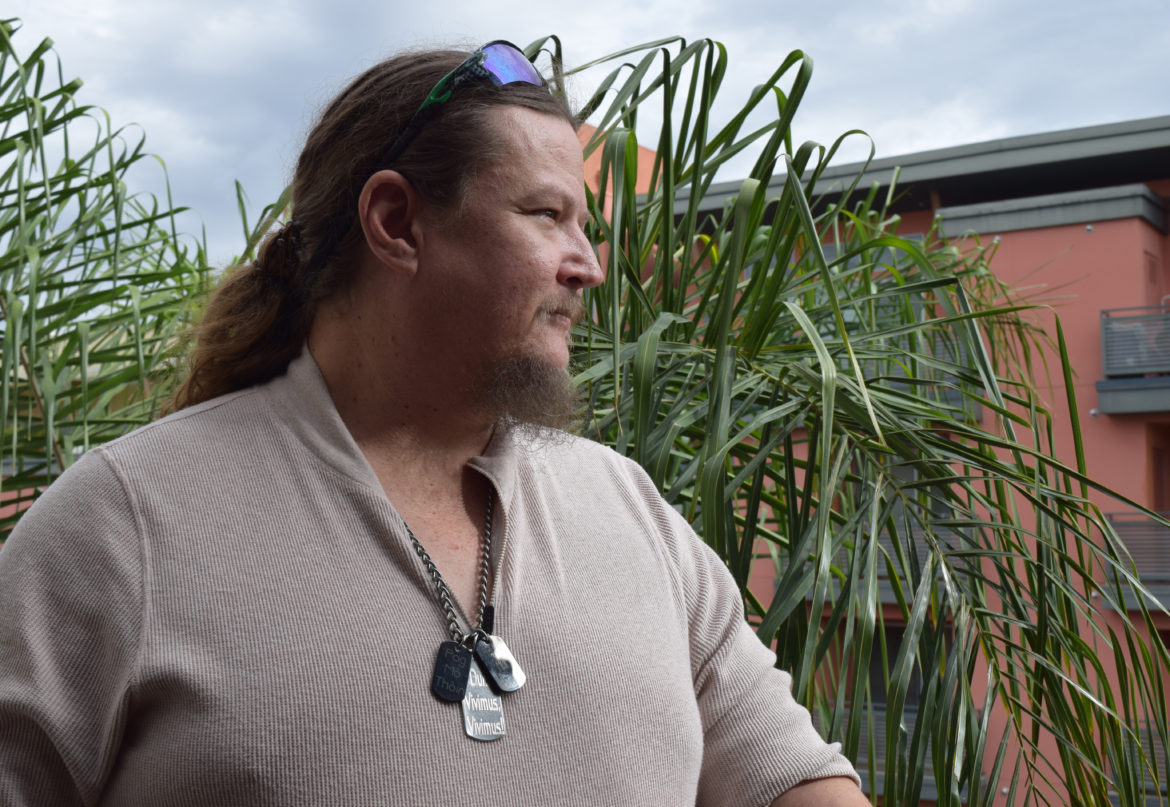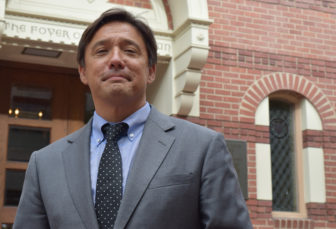
Rachel Cohrs
Ryan Lo, a former juvenile offender who was tried as an adult, is now a mentor to incarcerated inmates. He gazes out from the balcony of his North Hollywood apartment.
LOS ANGELES — Seventeen-year-old Ryan Lo sat in a courtroom for the hearing where a judge would decide whether he would be tried as an adult on charges of first-degree murder.
In 36 seconds, the judge read the decision: Lo would be tried as an adult.
Afterward, Lo turned to his lawyer and asked if he could vote and drink alcohol because he was technically an adult.
“He said, ‘You’re only an adult because they want to punish you,’” Lo said.
 On Election Day, California voters have a chance to fundamentally alter the frequency and design of these “transfer hearings” where juveniles can be sent to be tried in the adult justice system.
On Election Day, California voters have a chance to fundamentally alter the frequency and design of these “transfer hearings” where juveniles can be sent to be tried in the adult justice system.
Proposition 57 has two key juvenile justice impacts. First, it would take the power prosecutors currently have to try certain juveniles directly in the adult system and return that decision to judges. Second, it would change the criteria judges use to determine which juveniles should be tried in the adult system.
In part, Proposition 57 would undo processes instituted in 2000 under Proposition 21. Voters passed Proposition 21 during an era of “tough on crime” policy fervor. The initiative created automatic referrals to the adult system for juveniles charged with certain serious crimes and allowed prosecutors discretion to decide whether to directly file other charges into the adult system.

Rourke Stacy
Rourke Stacy, a co-drafter of Proposition 57 who is an attorney in the Los Angeles County Public Defender’s Office, argues that Proposition 21’s direct filing process gave too much power to prosecutors. Prosecutors have to make judgments on whether to charge juveniles as adults within 48 hours based on the police report. According to an analysis by the Burns Institute for Juvenile Justice Fairness and Equity, since 2003 more than 10,000 youth have been tried as adults in California, and 70 percent of those cases were directly filed.
“The desire to please the public as opposed to doing what’s right for the child creates a conflict of interest. When we take [the decision to try juveniles as adults] away from people in the media who are looking for votes, it is better for witnesses and victims,” Stacy said.
Under Proposition 57, each juvenile would be required to have a transfer hearing and a judge would weigh the evidence to determine if the youth would be tried as an adult.
After getting six college degrees during 23 years in prison, Lo was released on parole and now works as a Soros Justice Fellow and a mentor to incarcerated inmates. He said a transfer to the adult system can be one of the most important decisions made in a juvenile offender’s life.
“There’s no hearing. It’s a major, life-altering thing that happens based on an unelected functionary’s decision. It’s the only time in our process that we do that,” Lo said.
On the other side, Sean Van Leeuwen, the vice president of the Association for Los Angeles Deputy Sheriffs, said that Proposition 21 only applies to a few violent crimes where he thinks adult prosecution is appropriate. Statewide, the Burns Institute analysis found that 4.5 percent of juvenile felony arrests were filed directly into the adult system.
“[Proposition 57] would take away a mechanism to put away the worst of the worst. I’m not advocating for mass putting children in prison, but it’s not a good option to have a lack of direct file, which is a good tool to have,” Van Leeuwen said.
It’s preferable to have prosecutors making the decisions because they have more direct accountability to the public, he said. “Judges aren’t interested in whether direct file leads to more crime, but part of a DA’s responsibility is to be a crime suppressor.”
If Proposition 57 passes, it will also alter the procedures judges use to evaluate whether juveniles should be transferred to adult court.
Currently, a juvenile only has to meet one of the following five criteria to be sent to the adult system: criminal sophistication, a lack of ability to be rehabilitated in the juvenile system, previous criminal history, failure of previous rehabilitation and seriousness of the crime.
If Proposition 57 passes, juveniles wouldn’t be automatically transferred for meeting just one of the criteria. Judges would evaluate the overall evidence to determine if, on balance, juveniles should be transferred regardless of the specific number of criteria they meet.
“This is a critical hearing in a child’s life. It’s not about gaming the system, it’s about how can we make things more fair,” Stacy said.
Van Leeuwen said he thinks the system is fair now because youth have to have a violent crime to end up being tried as an adult, and the juvenile system has diversion and probation options for lower-level offenders.
“There are bad people out there. Some bad people are under 18. … Nobody is being put into prison for no reason,” he said.
Entering the prison system young can have significant impacts on juveniles’ health, wellness and recidivism. As Lo experienced, upon turning 18 juveniles are put into a prison system with more sophisticated criminals.
“In prison they have got 10,000 mentors, most of whom do not have their best interests at heart,” Lo said.
Because juveniles are often physically smaller than their adult counterparts, they can be more vulnerable to sexual violence in prison. A 2009 report from the National Prison Rape Elimination Coalition called youth incarcerated with adults the group “probably at the highest risk of sexual abuse.”

Rachel Cohrs
Cyn Yamashiro, an attorney on the Los Angeles County Probation Commission, says that on the adult side of the justice system “there is nothing for kids.”
“It is obvious that [juveniles] are targets for predators in the system,” said Cyn Yamashiro, a juvenile justice advocate, member of the Los Angeles County Probation Commission and former public defender.
Even if juveniles aren’t directly exposed to violence themselves, Lo said the prison environment can still be scarring to young minds.
“Even if you’re never touched, and there’s never any violence directed toward you, you can’t exist in that space and not see the horror show,” he said.
According to a 2007 synthesis of six nationwide studies by the Centers for Disease Control and Prevention, juveniles who enter the prison system also have higher recidivism rates with more violent crimes than those who remain in the juvenile system.
“The purpose of the juvenile system is genuinely to rehabilitate. In juvenile court the judge has a much richer menu of services to choose from to try to rehabilitate these kids, but on the adult side there is nothing for kids,” Yamashiro said.
While the original proposition only contained the juvenile justice reforms, California Gov. Jerry Brown added a section to address parole for nonviolent offenders. These provisions would allow a parole hearing after an inmate serves a base sentence, but before enhancements apply. Further, it would allow inmates to earn more good behavior credits.
Brown’s addition ended up in the California Supreme Court, where the court ruled in his favor. The additions have drawn the ire of law enforcement across the state and debate over the definition of “nonviolent.”
Though the process has been controversial, juvenile justice advocates turned to the ballot because they didn’t find success through the state Legislature. Yamashiro said juvenile justice changes can be tough to pass because legislators are loath to seem soft on crime.
“It only takes one offender to do something high-profile and that legislator is finished,” Yamashiro said.
Van Leeuwen voiced concern that the initiative is too simplistic, and that advocates should look for opportunities for reform instead of abolishing direct file altogether.
“We don’t want to legislate by sound bite. People just hear sound bites, and then they go into effect the next day,” he said.
A USC Dornsife/Los Angeles Times poll in early September found that 66 percent of registered voters surveyed were in favor of Proposition 57. The margin of error was plus or minus three percentage points.
The support for Proposition 57 may be signaling a shift in Californians’ views on criminal justice issues, Yamashiro said.
“We had reached a point in society before when all people cared about was law and order,” he said. “It seems that public sentiment has shifted to a more thoughtful approach to dealing with issues like crime.”
Pingback: CA Voters Could Limit Prosecutors’ Power in Teen Cases | The Crime Report
Here are the facts about poor Mr. Lo, as taken from his court decision.
“Seventeen-year-old Ryan Lo was tried by the court-along with one of two confederates-for the heinous, cold-blooded murder of Damian McKenna. Lo lured McKenna to a remote area and shot him twice in the head. Fearing McKenna was not dead, he then smashed McKenna’s head with a rock. Lo, who was in the company of 19-year-old Jonathan Lee Freshour at the time of the crime, committed the acts resulting in the death. He was solicited to commit the crime by 16-year-old Destinni Mardesich, McKenna’s former girlfriend-and mother of McKenna’s minor child-who feared McKenna would attempt to obtain custody of their son.
Lo and Mardesich bragged about the murder to others before they were caught, then laughed about the killing when they were placed in the same room after their arrest. Lo and Mardesich, tried as adults, were convicted of premeditated murder in their joint court trial, and Freshour was convicted in a separate proceeding.”
Perhaps the readers would like to know a little about the murder Ryan Lo committed. Here are the facts, as taken from the court decision on his appeal.
“Seventeen-year-old Ryan Lo was tried by the court-along with one of two confederates-for the heinous, cold-blooded murder of Damian McKenna. Lo lured McKenna to a remote area and shot him twice in the head. Fearing McKenna was not dead, he then smashed McKenna’s head with a rock. Lo, who was in the company of 19-year-old Jonathan Lee Freshour at the time of the crime, committed the acts resulting in the death. He was solicited to commit the crime by 16-year-old Destinni Mardesich, McKenna’s former girlfriend-and mother of McKenna’s minor child-who feared McKenna would attempt to obtain custody of their son.
Lo and Mardesich bragged about the murder to others before they were caught, then laughed about the killing when they were placed in the same room after their arrest. Lo and Mardesich, tried as adults, were convicted of premeditated murder in their joint court trial, and Freshour was convicted in a separate proceeding.”
Thanks for finally talking about >Proposition 57 Would Return Juvenile Transfer Power to
Jufges from Prosecutors in California | Juvenile Justice Information Exchange <Liked it!